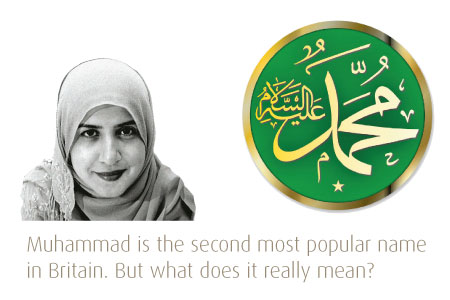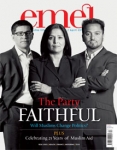
My name is (Jan)Mohamed
Issue 67 April 2010
Muhammed is the second most popular name in Britain. But what does it really mean?
A woman is not usually called Muhammad. So imagine my surprise when the BBC rang me up to ask if I was interested in appearing in a documentary called “My Name is Muhammad”, to explore the lives of different Muslims in Britain.
“Do you have a strong relationship with your surname?” she asked. “Not really, other than it being my father’s name. But I do have a bittersweet relationship with my first name, does that count?” I am a firm believer that individuals can and do have a relationship with their name, and although Shelina is pretty and memorable, I feel sad that it didn’t have any spiritual, religious or wisdom-oriented influence. I only discovered its meaning latterly in life. Shelina is “full moon.” Perhaps I could aspire to the notion of reflecting beauty and light!
I had always longed for a name taken from the Islamic tradition, and so when I started writing, I adopted ‘Zahra’ as my middle name, in honour of the daughter of the Prophet Muhammad. As though my unwieldy seven syllable name wasn’t already long enough.
Which reminded me when I spoke to the BBC producer about one strong experience I did have about my surname: “It’s a pain to spell on the phone, with all those Ns and Ms.”
I did have the opportunity to change my name to something far more manageable when I got married – one of those names that sounds like a modern celebrity brand (I’ve always hankered in particular for a one-name recognition). However, in homage to the Islamic tradition of women keeping their names when they get married, I stuck to my own polysyllabic identifier. It always struck me as strange that women still change their surnames when they get married – after all, this tradition originates from a time when the surname reflected whose property a woman was, and she changed it to her husband’s name to show she was now his property.
Muhammad is the second most popular name in Britain today, second only to Jack, registered under 14 different spellings. This does not include cultural variations like the Turkish Mehmet or the Mamadou of Senegal. The name’s popularity is unsurprising given how dear Muslims hold their Prophet. Also, Islamic tradition advises that one of the parental responsibilities is to give a child a good name.
I remember fondly my all-time favourite email campaign which lobbied for the standardisation of the spelling of ‘Muhammad’ so the ummah can finally be united under the banner of one lexicography. I failed at the first hurdle, my own name being the culprit. Muslims ought to focus on more important things than squabbling over which transliteration is right. The answer: none of them, it’s an Arabic name, so instead, let’s move on to fighting prejudice, Islamophobia and discrimination against the name itself and the people who hold them.
For example, a study by the Department for Work and Pensions showed that racial discrimination occurred for those applying for jobs with a name suggesting they were from an ethnic minority, rather than white British. For every nine applications sent by a white applicant, an equally good applicant with an ethnic minority name had to send sixteen to obtain a positive response. In the current time of high unemployment and recession it is a particular worry that a name like Muhammad along with other such names can restrict employment opportunities.
Of course, whilst I have not seen statistical evidence on profiling by name, anyone who has the name Muhammad or similar will give you plenty of anecdotal evidence that they have been singled out and pulled aside for questioning or investigation while travelling.
And yet whilst holding the name of the Prophet in such high esteem, Muslims appear to have a peculiar relationship with it, the name being more than its meaning. The case of the Sudanese teddy bear named Muhammad was the most peculiar demonstration of this. The children chose to name their bear Muhammad, presumably indicating a familiarity and endearment with this name by attaching it to something that they loved. Yet this was considered by some to be an ‘insult’.
In my opinion, an insult to the name Muhammad are criminals like Mohammad Sidique Khan who kill innocent human beings. To honour the name is to live its meaning, like Muhammad Ali who stood up as a man of conscience.
As a (Jan) Mohamed, I’ll be trying my best to honour it too.
Bookmark this |
|
Add to DIGG |
|
Add to del.icio.us |
|
Stumble this |
|
Share on Facebook |
|
Share this |
|
Send to a Friend |
|
Link to this |
|
Printer Friendly |
|
Print in plain text |
|


Comments
0 Comments